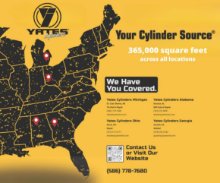U. S. Steel Announces Strategic Actions to Strengthen Company; Updates Q3 Outlook
09/17/2014 - United States Steel Corporation announced three key strategic actions that support its transformation:
- the decision by U. S. Steel to not proceed with an expansion at its iron ore pellet operations in Keewatin, Minn.;
- the decision by U. S. Steel to forgo further development and construction of the carbon alloy facilities at Gary Works in Gary, Ind.; and
- the unanimous decision by the board of directors of its Canadian subsidiary, U. S. Steel Canada Inc. to apply for relief for U. S. Steel Canada Inc. from its creditors pursuant to Canada's Companies' Creditors Arrangement Act (CCAA).
Keetac expansion and Gary Works Carbon Alloy Module Construction
U. S. Steel has decided not to pursue an expansion of its iron ore pellet operations at Keetac in Keewatin, Minn. The expansion would have increased the facility's production by 3.6 million tons annually to a total of 9.6 million tons, and included upgrading and restarting an idled pelletizing line, as well as upgrading the mining, concentrating and agglomerating processes at Keetac. The permits required for this expansion expire this month and will not be renewed.
U. S. Steel has also decided not to proceed with additional investments into the carbon alloy facilities at Gary Works. This project, which began in 2011, contemplated the construction of two modules to provide a carbon alloy material used to replace traditionally manufactured coke, to the Gary Works blast furnaces. One module, C module, has been built and will be permanently idled while a second, D module, will not be constructed.
The estimated capital investment that would have been required to complete these projects was in excess of US$800 million. We estimate that these two strategic actions will result in a non-cash, pre-tax charge of approximately US$250 million in the third quarter, which includes approximately US$40 million for Keetac and approximately US$210 million for Gary Works.
In making these decisions, U. S. Steel considered its future raw materials needs for iron ore and coke, and found its current production capability sufficient. The previously announced examination of alternative iron and steelmaking technologies such as gas-based, direct reduced iron (DRI) and electric arc furnace (EAF) steelmaking are not affected by these decisions. The company is seeking permits for the possible construction of an EAF at its Fairfield Works in Alabama.
Commenting on the actions relative to the Keetac expansion and Gary Works carbon alloy facilities, U. S. Steel president and CEO Mario Longhi said, "The decisions to stop further efforts relative to these investments represent another step in our transformation to earn the right to grow. These strategic decisions allow us to redirect funding to projects to further develop advanced high-strength steels for our automotive customers, premium connections for our energy market customers, and capital expenditures to update and modernize our operations."
U. S. Steel Canada Companies' Creditors Arrangement Act (CCAA) filing
U. S. Steel Canada has recorded a loss from operations in each of the last five years, with an aggregate operating loss of approximately US$2.4 billion, or in excess of US$16.00 per diluted share, since December 2009. Additionally, U. S. Steel Canada represents approximately US$1 billion of U. S. Steel's consolidated Employee Benefits liability as of 30 June 2014. As a result of the CCAA filing, U. S. Steel has determined that U. S. Steel Canada and its subsidiaries will be deconsolidated from U. S. Steel's financial statements on a prospective basis effective as of the date of the CCAA filing. The deconsolidation of U. S. Steel Canada's operating results would have increased net income on a pro forma basis for the six months ended 30 June 2014 by US$26 million, or US$0.16 per diluted share. U. S. Steel has agreed to provide U. S. Steel Canada with CAUS$185 million (approximately US$165 million) of secured debtor-in-possession financing (DIP Financing) to support current operations through the end of 2015 and allow U. S. Steel Canada to continue operating and serving its customers.
"A planned restructuring will allow U. S. Steel Canada to operate and compete more effectively. We know this was not an easy decision for U. S. Steel Canada's independent directors," stated U. S. Steel President and CEOMario Longhi. "U. S. Steel Canada has asked the court for an order allowing it to continue to operate while exploring restructuring alternatives — to pay its suppliers and employees and to continue to service its customers. We believe these actions will provide longer term stability for U. S. Steel's employees, suppliers and customers."
The CCAA filing is an event of default under the terms of the Province Note Loan Agreement dated as of 31 March 2006 which also provide that the Province Note became immediately due and payable. The principal amount due under the Province Note is CAUS$150 million (approximately US$136 million). A failure of U. S. Steel Canada to pay the Province Note when due would constitute an event of default under the indenture for U. S. Steel's 2.75% Senior Convertible Notes Due 2019 (2019 Notes) that enables the holders to declare the 2019 Notes immediately due and payable. Although the 2019 Notes are currently trading well above par, if this occurs, U. S. Steel plans to use cash to pay the outstanding principal amount of US$316 million. The filing does not trigger any other events of default under any material U. S. Steel Canada or U. S. Steel financing arrangements.
Update to Third Quarter Outlook
U. S. Steel expects a significant improvement in operating income for its reportable segments and Other Businesses in the third quarter. Steel market conditions in the U.S. have remained stable and its operations have performed well. As a result, it expects third quarter results, excluding the items described below, to be significantly higher than the current consensus earnings per share estimates.
As a result of these three strategic actions, it estimates a non-cash, pretax charge of between US$550 million and US$600 million (approximately US$300 million to US$350 million from the CCAA filing and deconsolidation of U. S. Steel Canada and approximately US$250 million for the other two strategic actions). In August, it completed the sale of surface rights and mineral royalty revenue streams in the state of Alabama, which has generated approximately US$55 million of cash and pre-tax income, and it made a US$140 million voluntary contribution to its main defined benefit pension plan. Its cash balance as of 31 August 2014 was US$1.4 billion after the receipt of the US$55 million and the payment of the US$140 million described above, as well as a rebuilding of inventories depleted in the second quarter.






